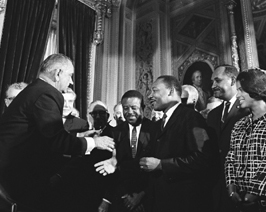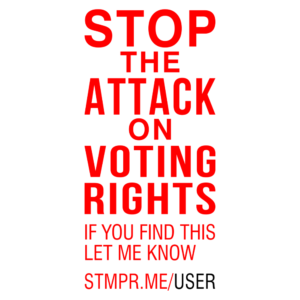Activists across the country are taking to the streets this week to mark the six-year anniversary of the Supreme Court’s decision in Shelby County v. Holder. The decision, handed down on June 25, 2013, stripped the Voting Rights Act of 1965 of its enforcement powers, allowing voter suppression to continue to plague our democracy without repercussions.
Background
Despite the passage of the 15th Amendment in 1870 granting African Americans the right to vote, many communities in the South did everything in their power to keep them from the ballot box. Tactics included literacy tests and requiring black voters to recite the Constitution in its entirety. During the civil rights movement of the 1960s, Dr. King, Hosea Williams of the SCLC, John Lewis of the SNCC (now a House Representative for Georgia), and thousands of other activists held two separate marches from Selma, AL for the right to vote. When President Lyndon B. Johnson signed the Voting Rights Act of 1965 into law with Dr. King and other civil rights leaders at his side, the threat of voter suppression still loomed.

Fast forward to 2013. Under Section 5 of the Voting Rights Act of 1965, states with a history of voter discrimination were required to receive “preclearance” (federal approval) before making any change to voting practices that might affect minority voters. The preclearance practice was meant to prevent voter discrimination, rather than react to it. Section 4(b) of the VRA decided which states were subject to preclearance. Shelby County, Alabama sued and claimed that Sections 4(b) and 5 of the VRA were unconstitutional, and SCOTUS did away with preclearance in a 5-4 decision. According to Chief Justice John Roberts, preclearance was no longer “grounded in current conditions” because the “country has changed” since the formula was first adopted in 1965. Thus states that had historically discriminated in their voting practices were given carte blanche to do so again. And they have.
Restoring the Voting Rights Act
Since the Shelby County decision, legislators and citizen activists have worked tirelessly to restore the Voting Rights Act. Members of Congress on both sides of the aisle have introduced several pieces of legislation to this end, one of the most recent being the Voting Rights Advancement Act (H.R. 4), introduced by Rep. Sewell (D-AL) and Rep. Leahy (D-VT).
Over the week of June 24-30, meanwhile, the Leadership Conference on Civil and Human Rights and its partners have engaged in a series of actions in DC and across the country in support of the Voting Rights Advancement Act. Speakers include Stacey Abrams and Rep. Teri Sewell.
Americans want a system that works for every voter. Millions of people have made it clear
that they want to build a representative and functioning democracy where everyone, regardless of race or color, can participate. In 2018, voters turned out in record numbers to support laws and policies aimed at making voting more accessible and eliminating unnecessary, racist barriers to the ballot box. For example:
- Floridians passed a law to amend their constitution and restore voting rights to 1.4 million people with past felony convictions.
- Nevada, Maine, Massachusetts, Michigan, New Jersey, Maryland, and Washington have passed automatic voter registration in the last 18 months.
Congress must deliver at the national level by passing the Voting Rights Advancement Act to ensure that we have the tools we need to address current racial discrimination in voting. You can make your voice heard by calling your representatives and stamping your money with our voting rights stamps!


For additional reading on Shelby County v. Holder and the Voting Rights Act, check out Vox and the Brennan Center for Justice.
